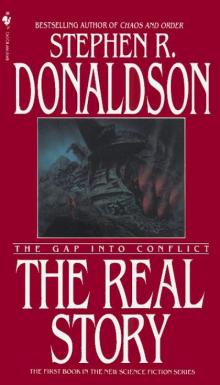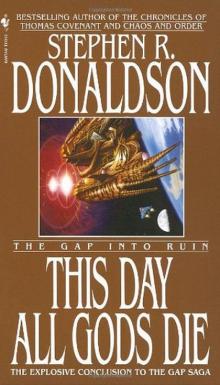- Home
- Stephen R. Donaldson
A Dark and Hungry God Arises Page 3
A Dark and Hungry God Arises Read online
Page 3
Warden Dios raised his eyebrows to convey the impression that he was surprised. Captain Sixten Vertigus, commander of the SMI probe ship Deep Star, was the first human being who had ever seen an Amnioni.
“He must be all of ninety by now,” Min went on, “but he’s still able to sit up straight while the rest of the Council natters. By seniority, at any rate, he’s the senior member for the United Western Bloc, but he doesn’t wield any real power. According to the news broadcasts, he makes periodic speeches denouncing the Dragon’s ‘quest for UMC hegemony.’ On the other hand, he votes on our side whenever one of our issues comes up.
“What do you want him for?”
Warden held himself perfectly still, determined to give the ED director no hint of his urgency. In a steady, conversational tone, he answered, “I want you to talk to him for me. I want you to convince him to introduce GCES legislation that will sever us from the UMC. We need to be a separate entity, accountable only to the Council itself—we need to be the human police, not just the Dragon’s private enforcement agency. I want him to put a bill of severance in front of the GCES, and I want him to do it now.”
The colors shining from Min’s form told Warden that she’d been waiting a long time to hear him say something like this.
“Get everything ready yourself,” he continued. “Lay it all out for him. Convince him to put all of his personal prestige, all of his experience, all of his passion behind it.”
He knew Sixten Vertigus to be a man of considerable passion. Otherwise he wouldn’t have violated Holt Fasner’s direct orders by making personal contact with the Amnion.
“And don’t let him get bogged down by details. Write the bill for him if you have to. The big thing he’ll want to know—what all the members will want to know—is how we’ll be financed. What kind of revenue source can take the place of the UMC coffers. The answer is, tax every company that does any kind of business in space. Most of the money will still come from the UMC. But if we’re separately constituted, if we’re an independent branch of the government instead of an arm of the UMC, we’ll be able to function the way cops should.
“I want that bill in front of the GCES within forty-eight hours.”
Before Holt learns what’s happening on Thanatos Minor.
Min’s eyes shone like her aura. Facing him straight, she said softly, “The Dragon will never let you get away with it. For one thing, he has the votes to stop you. And when he finds out what you’re up to, he’ll consider it a betrayal. He’s still your boss. He has the corporate authority—as well as the personal clout—to fire you.”
Slowly the director of the UMCP smiled. “That’s why the whole business is absolutely confidential. If Godsen or even Hashi hears one word about this—if anybody except you, me, and Captain Vertigus so much as smells the truth—all of it,” all of us, maybe all of humanity, “will be wasted.
“In fact, it’s essential to keep me out of it entirely. Even Captain Vertigus can’t know it’s my idea. As far as he’s concerned, it comes from you. I want him to do it because he believes in it, not because he thinks I’m trying to outmaneuver Holt.”
Min nodded once, sharply. “Director—” she began, “Warden—” But she had to think for a moment or two before she said, “I’m not going to ask you what this has to do with sending Angus and Milos against Billingate. But I am going to ask you to watch your back. You could get killed playing a game like this.”
“Min, Min”—Warden spread his hands in a gesture of humorous helplessness—“he’s only a Dragon. He isn’t God.”
She wasn’t amused. “No, and you aren’t either. I bet you might even bleed if he cut your heart out. I bet—”
She might have gone on: she was charged with her own passion, and had too few outlets for it. But she was interrupted by a timid knock at the CO Room door.
The door slid open without permission. One of Center’s communications techs, looking pale and more than a little apprehensive, ventured her head into the room.
“Director?”
Instinctively irritated, Warden wanted to snarl at her, Don’t be such a damn sheep. When was the last time I murdered—not to mention demoted, or even reprimanded—a communications tech for simply doing her job?
He stifled the impulse, however. It was dangerous; symptomatic of a tension he couldn’t afford to betray. Smiling to disguise his vexation, he waited for the tech to explain herself.
“It’s the PR director,” she said, fumbling slightly. “Godsen Frik. He’s trying to get in touch with you. He says it’s urgent. I can route it to your intercom.” She nodded at the console in front of him.
Warden forced himself to continue smiling despite the sting of anxiety in his veins. “Thank you, technician.” Damned if he was going to make the effort to remember the woman’s name at a time like this. “Please tell Director Frik that he just missed me.” When the tech hesitated, he added quietly, “Dismissed.”
She pulled her face out of the doorway, and the door closed itself.
Min Donner didn’t say anything. That was a relief. Maybe his love for her wasn’t so impersonal after all. Or maybe he was just grateful that she still trusted him enough to let him arrange his own doom without hounding him with questions.
She should have asked her questions. She had the right. After all, she was his most valued assistant, his staunchest supporter; occasionally his bodyguard; sometimes his executioner. Unless he was very careful—and unless she did everything he told her to do exactly the way he told her to do it—his doom would almost certainly carry her with it, for good or ill.
That danger was one reason he grieved.
One reason among many.
MILOS
ilos’ scalp itched. In fact, his whole body itched. He was dirty—too dirty. He abhorred having this much grime ground into his hands and shipsuit, this much oil on his face, this much old sweat crusting in his crotch. Even as a kid, he’d been far too fastidious to let himself get into a condition like this. He felt like he’d had excrement rubbed all over him.
That made him angrier than he’d ever been in his life.
None of this was his fault, of course. Hadn’t he played straight with the United Mining Companies shit Police? Well, hadn’t he? Yes, he had. He played straight with everybody who paid him. Even Com-Mine Security, who might conceivably view the matter in another light, had no legitimate complaint against him.
Sure, he’d risked Station supplies to help Succorso trap Thermopyle—on Hashi Lebwohl’s orders, not Com-Mine’s—but that gamble had paid off handsomely. And once Thermopyle was in lockup, Milos had done everything any deputy chief could have done to break him. If Security didn’t like the results, let them blame Thermopyle, not Milos.
Milos Taverner played straight. He gave value for the money he received.
Unless his own neck was in the noose. Then he looked after his own safety and let the people who paid him take care of themselves. But no one could hold that against him. It was a pardonable human characteristic. An instinct for survival was as necessary—and as inescapable—as the impulse to eat and drink.
It certainly didn’t justify what Hashi Lebwohl—and Warden Dios, of all people!—were doing to him now.
They were forcing his neck into the noose with a vengeance.
And they had less reason to complain about him than Com-Mine did. Caught between Lebwohl’s orders to keep Thermopyle silent and Security’s orders to break him, Milos had satisfied the former at the expense of the latter. The fact that Angus had obstinately declined to be broken was beside the point. Milos had met DA’s requirements. Neither Lebwohl nor Dios had any reason to criticize the results he’d obtained for them.
Yet here he was: sitting at Trumpet’s second’s station, at least nominally responsible for communications, scan, and data and damage control; about to go into tach with the same slimy illegal he’d once ambushed; about to face disaster and death in forbidden space—and not only had he been forced into this position by the very peopl
e he’d just satisfied, but he’d been forced into it dirty.
So that he would be a believable second for Captain Thermopyle, who was known on Thanatos Minor: so they said. Shit. He knew the real reason, and it had nothing to do with believability. It had to do with humiliation and control.
Milos couldn’t remember a time when he hadn’t understood such things.
Ever since his childhood in one of Earth’s more degraded and pestilential cities, he’d been aware that the only effective way to evade the harm a guttergang might do him was to make himself valuable by passing along information about the plans and doings of some other bunch of thugs; purchase safety with other people’s secrets. Then he was thought of as an important resource by the first guttergang: he was protected.
But of course that couldn’t last. Eventually the second guttergang would guess what he was doing and come after him. Then the situation would be too dangerous to survive. So the only effective way to keep his skin whole was to pass information both ways: to make himself essential to both guttergangs—or to three or four, or however many there were—and to control as much as possible what the gangs knew, in order to mask his own intricate loyalties.
Yet even that wasn’t enough. Guttergangs protected their sources of information—in those days, kids like Milos were called “buggers”—but didn’t respect them. Whenever the thugs felt like it, they brutalized and tormented their buggers. Like the UMCP, they forced their buggers into dangerous and shaming tests of loyalty.
Humiliation and control.
By the time he was ten, Milos Taverner had learned how to deal with those as well.
It was amazingly easy. A word or two in the right places—not too often, not too obviously—and individual pieces of slime who degraded or scared him were destructed. Guttergangs may not have respected their buggers, but they had too much to lose by letting someone else damage their sources of information.
All Milos needed, the one absolute requirement for keeping his neck out of the noose, was to make sure that no one knew he was buggering for both sides.
So mighty Warden Dios and his precious Hashi Lebwohl—not to mention the sanctimonious Min Donner—were wrong about Milos. They didn’t know what their own actions could cost them.
They thought that if they rubbed his nose in their power hard enough, if they made him feel beaten and filthy enough, they could compel him to submit to having his neck in the noose.
Milos didn’t doubt for a second that the noose was real. After all, if none of Lebwohl’s and Dios’ plans went awry, there weren’t likely to be many survivors on Thanatos Minor when their pet cyborg carried out his programming. And Milos wasn’t likely to be one of them: he didn’t have Thermopyle’s enhanced resources to help him escape alive.
Which of course was exactly what Lebwohl and Dios were counting on. If Trumpet brought anyone back to UMCPHQ, it would be the cyborg they had spent so much money on, not the relatively inexpensive human being.
They should have known better.
They shouldn’t have let him have the command codes that ruled Thermopyle. If they hadn’t given him the capacity to redirect Angus’ prewritten exigencies, he would have had only one option left; only one place to go with his anger. Now, however, he had several.
One of his options was to make Thermopyle pay at least some of the price of his, Milos’, humiliation.
But not here: not this close to UMCPHQ; not while it was still possible for the cops to monitor whatever happened aboard Trumpet. Milos was prepared to wait awhile. At least until this gap scout—a ship which Angus knew intimately, and which Milos understood very little—resumed tard on the other side of the dimensional gap.
So he didn’t respond to the crude gibes Angus aimed at him almost incessantly. In any case, he knew perfectly well that those insults were just so much spatter and froth, an almost incidental by-product of Angus’ seething malice. Angus wasn’t paying any real attention to his second. All the important parts of the cyborg’s mind were focused on his new ship: on feeling her energies under his hands; on studying every scrap of knowledge his databases contained about her. On imagining what he could do with her.
No, more than just imagining: tasting; sensing with his whole body. Milos had seen enough malevolence in Angus’ eyes to sicken him for a lifetime. He felt that he and he alone—certainly not Hashi Lebwohl or Warden Dios—could gauge the sheer potency of the venom which boiled and spat inside Angus Thermopyle like a witch’s brew. He knew how alive with hate Angus was. But he’d never discerned in Angus anything resembling the look of unholy joy which burned across the cyborg’s face while he familiarized himself with Trumpet. As he worked his board and studied his screens, Thermopyle looked like he was having an orgasm.
Shit. And shit again.
Once Trumpet crossed the gap, Milos would have to begin exercising his power over his putative “captain” fast and hard. He wanted to crush that look of vile ecstasy almost as much as he wanted to live.
But not now; not yet. Instead of reacting to Angus’ sneers, Milos concentrated on his own board, learning as quickly as he could how his brief but primarily theoretical training for this ship functioned in practice.
Damage control was easy: most of the systems, and all the reports, were automatic. Data wasn’t much different than the kind of computer work he’d done for years as Com-Mine Station’s deputy chief of Security. And, for reasons which were probably obvious, but which he never mentioned, he already knew everything he would ever need about communications. Scan was another matter, however. He’d never used doppler sensors or particle sifters or—was that a dimensional stress indicator?—and had only the thinnest understanding of the information they provided.
None of his “duties” affected the actual operation of the ship, however. That was a problem of another kind. Command, helm, targ, engineering; even life support and general maintenance: Angus ran them all. In practice as well as in theory, Milos’ survival depended on his capacity to run Angus.
“You about ready?” Angus asked, sounding as cheerfully destructive as an ore-crusher. “We’re coming into the fucking cops’ fucking private tach range in a couple of minutes. I don’t want you shitting your suit when we hit the gap. I hate that smell. I get too much of it just having you on board.”
“So what?” Milos muttered, keeping his attention on his readouts. “You hate everything.” He loathed and feared the very timbre of Angus’ voice; but it was essential to show Angus that he, Milos, couldn’t be intimidated. “A bad smell won’t change anything.”
Angus snorted. “So you say. But you haven’t caught a whiff of yourself yet. You don’t know as much about shit as I do.”
Milos didn’t bother to retort. He’d been raised among guttergangs. And he’d spent months back on Com-Mine interrogating Angus. He already had more experience than he would ever need with excremental human corruption.
The helm screen informed him that Trumpet was fifty-three seconds from the UMCP’s reserved gap range. She was assigned to go into tach in a minute and a half.
Then human space would be out of reach.
For both of them.
Maybe forever.
When that happened, Angus Thermopyle was going to find out just how much Milos Taverner knew about shit and survival.
Eighty seconds later Angus said, almost crowed, “Hang on to your balls. As soon as we cross, everything changes. You bastards have just corn-holed me for the last time.”
Milos knew that wasn’t true. In an apparent effort to reassure him, Hashi Lebwohl had allowed him to watch a number of Angus’ tests on UMCPDA’s monitors. And he’d been given many of the test results to read. They all demonstrated incontrovertibly that Angus had been well and thoroughly welded; that he would never be able to violate his programming. For all his enhanced capabilities, he was the most helpless being in human space.
Nevertheless, without thinking about it, without even realizing he did it, Milos cupped his hand over his crotch as Tru
mpet disappeared into the gap.
ANCILLARY DOCUMENTATION
BILLINGATE
ven while the power of the United Mining Companies Police was at its peak, a number of illegal or bootleg shipyards survived and occasionally flourished in and around human space.
The reason for their existence was simple. Forbidden space had a vast hunger for the same raw materials which Earth craved in such quantity, as well as for the mass-production technologies at which humankind excelled; a hunger which legal trade—both enabled and limited by the United Mining Companies—couldn’t satisfy. To feed this appetite, the Amnion were willing to pay well for what they desired, without questioning how those things were obtained. This was true despite explicit treaty to the contrary. Therefore piracy became a thriving subcutaneous industry. Theft offered a higher reward for a given amount of effort than honest prospecting or mining.
That the risks were great, or that the opportunities were unpredictable, were drawbacks which had never hindered crime at any time in human history. That piracy required fast and space-worthy vessels, however, would have been a significant drawback in the absence of bootleg shipyards. Ships were far more difficult to steal than their cargoes. If they were taken while in dock, they were often stopped before their new masters could escape. And if they were attacked somewhere in space, they were usually damaged too severely to be worth much.
Illegal shipyards came into being by the blunt logic of human larceny. A passion for profit was the engine which drove Earth and her widely scattered stations. When that passion was felt by men and women with unscrupulous souls, they acted on it illegally. The law of supply and demand guided many of them, not into piracy, but into providing support for pirates.
The best-known—because the best-defended—of these bootleg shipyards was the one called Billingate on Thanatos Minor.
There were a number of such shipyards within human space, of course. However, by virtue of their locations their existence was precarious: they were vulnerable to direct attack by the UMCP. In order to exist at all they required secrecy. Therefore they hid like ferrets; they moved whenever they could; often they kept their own operations—and profits—small so that they would be less susceptible to exposure or betrayal.

 The Illearth War
The Illearth War Last Chronicles of Thomas Covenant 02 - Fatal Revenant
Last Chronicles of Thomas Covenant 02 - Fatal Revenant Lord Foul's Bane
Lord Foul's Bane The Gap Into Ruin: This Day All Gods Die
The Gap Into Ruin: This Day All Gods Die White Gold Wielder
White Gold Wielder Fatal Revenant
Fatal Revenant The Mirror of Her Dreams
The Mirror of Her Dreams Against All Things Ending
Against All Things Ending The Real Story: The Gap Into Conflict
The Real Story: The Gap Into Conflict The Power That Preserves
The Power That Preserves Seventh Decimate
Seventh Decimate The Gap Into Power: A Dark and Hungry God Arises
The Gap Into Power: A Dark and Hungry God Arises A Man Rides Through
A Man Rides Through The Gap Into Vision: Forbidden Knowledge
The Gap Into Vision: Forbidden Knowledge The King's Justice: Two Novellas
The King's Justice: Two Novellas The Wounded Land
The Wounded Land The Runes of the Earth
The Runes of the Earth Mordant's Need
Mordant's Need The One Tree
The One Tree Gilden-Fire
Gilden-Fire Reave the Just and Other Tales
Reave the Just and Other Tales The Man Who Fought Alone
The Man Who Fought Alone The Last Dark
The Last Dark The Man Who Tried to Get Away
The Man Who Tried to Get Away Thomas Covenant 02: The Illearth War
Thomas Covenant 02: The Illearth War A Dark and Hungry God Arises
A Dark and Hungry God Arises The One Tree t2cotc-2
The One Tree t2cotc-2 Lord Foul's Bane cotc-1
Lord Foul's Bane cotc-1 The Illearth War t1cotc-2
The Illearth War t1cotc-2 The Runes of the Earth: The Last Chronicles of Thomas Covenant - Book One
The Runes of the Earth: The Last Chronicles of Thomas Covenant - Book One The King's Justice
The King's Justice White Gold Wielder t2cotc-3
White Gold Wielder t2cotc-3 The Power That Preserves t1cotc-3
The Power That Preserves t1cotc-3 Thomas Covenant 01: Lord Foul's Bane
Thomas Covenant 01: Lord Foul's Bane Chaos and Order: The Gap Into Madness
Chaos and Order: The Gap Into Madness Daughter of Regals
Daughter of Regals Forbidden Knowledge: The Gap Into Vision
Forbidden Knowledge: The Gap Into Vision Fatal Revenant t3cotc-2
Fatal Revenant t3cotc-2 The Runes of the Earth t3cotc-1
The Runes of the Earth t3cotc-1 Thomas Covenant 03: Power That Preserves
Thomas Covenant 03: Power That Preserves This Day all Gods Die: The Gap into Ruin
This Day all Gods Die: The Gap into Ruin The Wounded Land t2cotc-1
The Wounded Land t2cotc-1 This Day All Gods Die
This Day All Gods Die One Tree
One Tree